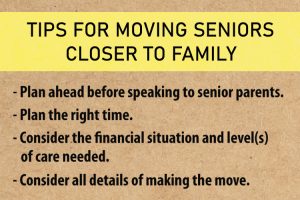
Posted: October 8, 2024
If you have elderly parents living in a different town, you might be wondering about the necessity and logistics for them to move closer to family. Whether you moved away from your hometown after college, or your parents relocated to a warmer climate when they retired. Regardless, the distance can raise questions about their future needs as they age.
 When older loved ones begin to struggle with the responsibilities of day-to-day living, it can be a challenge to determine what might be best for everyone. Ultimately, the decision to move closer to family is a personal one, and seniors should consider their own priorities, preferences, and goals for this stage of their life.
When older loved ones begin to struggle with the responsibilities of day-to-day living, it can be a challenge to determine what might be best for everyone. Ultimately, the decision to move closer to family is a personal one, and seniors should consider their own priorities, preferences, and goals for this stage of their life.
However, this potential change accompanies many questions you and your loved ones must evaluate before making any decisions. Every family’s circumstances are different and rely on various factors of the parents’ and children’s lives to develop a plan for taking the next step.
 Deciding when to move senior parents closer to family is a significant decision that involves careful consideration of various factors. The conversation itself is not only tough, but so is knowing when to have it.
Deciding when to move senior parents closer to family is a significant decision that involves careful consideration of various factors. The conversation itself is not only tough, but so is knowing when to have it.
Before making any decision or having a conversation, it’s important to recognize signs that suggest your parents may need more support. Noticing a difference in your parents’ activity or mindset may be the first indication of them requiring additional assistance.
Whether observed firsthand or through a close friend or relative who is keeping you updated, there are many signs that can help families evaluate whether it’s time to consider moving senior parents closer.
While some changes in your parents’ habits can be subtle, have you noticed your parent:
These signals are essential to observe and track regularly to ensure your parents’ safety and they may not even notice these actions in themselves.
Beyond habits changing, it is also wise to assess your parents’ current health status and any ongoing medical needs using a standardized model or assessment. The concept of ADLs (activities of daily living) developed by Dr. Sidney Katz are indicators that show a human’s ability to live independently. They include the following:
Scoring is either zero points if the activity can’t be performed or one point if it can. The higher the score, the more likely the person can live independently. As it is often hard to determine how many signs and signals prompt the conversation, using a studied concept can be a helpful way to present the idea without exuding bias or judgment.
No matter the means of observation, if these signs and symptoms become more evident over time, it may be beneficial to sit down with them and discuss the next best step for their health, safety and mental capacity.
Moving closer to family may require long-term planning, including legal and financial considerations such as estate planning, healthcare directives, and power of attorney arrangements.
Before you sit down to speak with your parents, make sure you have done your homework. Even if parents don’t live hundreds of miles away, if a relative cannot easily see them at least once a week to ensure their safety, it might as well be a million miles away. This is especially true if your family member is living with dementia.
Be sure to investigate the following areas when considering seniors moving closer to family:
This is a challenging conversation. It’s essential to respect and honor your parents and invite their collaboration. Having these conversations over a period of time will give them a sense of control and peace of mind about their future.
It’s essential to respect and honor your parents and invite their collaboration. Having these conversations over a period of time will give them a sense of control and peace of mind about their future.
Once it becomes clear that additional support is needed and the conversation has been had, the next question to ask is: should your senior parents move closer?
This decision involves weighing several factors, such as:
Moving can be expensive, so it’s essential to consider the financial implications of relocating your parents closer to family. Evaluate the cost of living in both locations and determine if the benefits of moving outweigh the expenses. You must also determine the level of care that is needed. Costs vary by the level of care, such as Assisted Living, Memory Support, and Independent Living. Inclusions and amenities will also impact costs. Typically, there is a base rate, which includes some meals, activities, programming, and utilities. There may be charges for additional support services, such as additional nursing care.

Talk with a geriatric care manager or social worker as you consider your options and what you can and cannot do for your parents. For example, you’ll need to consider whether they are taking their medications properly and whether they are eating properly. Has their mobility decreased? Is their overall health worsening? Are they becoming lonely or reclusive? All of these will help you in determining the level of care they’ll need.
In regards to their level of care, other items to think about include the following:
These items and more can add up so it is wise to map out a budget that keeps these considerations in mind and is beneficial to senior parents weighing their options.
Reflect on the level of social support your parents have in their current location. Moving closer to family can provide them with emotional support and companionship, which is crucial for their well-being.
In addition, assess the safety and security of your parents’ current living situation. Moving closer to family may provide them with a greater sense of security, especially if they are living alone.
Evaluate the quality of life your parents have in their current location compared to what they could have closer to family. Factors such as access to healthcare, recreational activities, and community engagement should be taken into account.
Nearly a third of elderly individuals admit to feeling lonelier as they age. The distance they have from the rest of the family can cause this sadness to set in. Asking parents if they experience loneliness in their current circumstances can help evaluate their emotional needs.
Another critical part of the moving process is considering your parents’ thoughts and feelings about relocating. This transition can be emotional and overwhelming, so it’s essential to include them in the conversation.
 Some key points to consider include:
Some key points to consider include:
In addition to the considerations above, another important aspect to consider in this decision is the family dynamics and how well you and your parents get along. Their health and safety are top priorities, but ensuring you feel content with their relocation is essential for your happiness.Setting boundaries and establishing reasonable goals before they move closer can help maintain a positive relationship where both parties can benefit from each other’s presence.
Ultimately, involving your parents in the decision-making is key because while moving closer to family may seem logical, it’s essential to respect your parents’ autonomy and what will make them happiest.
Explore senior living communities that can provide the level of care your parents need. It is always wise to research these options and discuss them before making the final decision to move.
Since many seniors who move from a home to a smaller place, downsizing becomes a crucial task.
 At Casey’s Pond in particular, we have a wide array of floor plans to choose from. Talk to your parents as early as possible about developing a plan for downsizing and be sure to acknowledge that downsizing and organizing their possessions may be an emotional task. Many families even use services of senior move managers to help ease the transition to a senior living community.
At Casey’s Pond in particular, we have a wide array of floor plans to choose from. Talk to your parents as early as possible about developing a plan for downsizing and be sure to acknowledge that downsizing and organizing their possessions may be an emotional task. Many families even use services of senior move managers to help ease the transition to a senior living community.
Encouraging parents to consider an assisted living community upon moving to a new area can help you both feel comfortable knowing quality care is more accessible than ever. Supportive communities for older adults provide a secure environment for residents to make new friends, receive proper care from trained staff members and continue their favorite activities each day
 Discussing these factors with your parents should make the decision to move a bit clearer. You may find this choice is not the best step because your schedule does not allow for this shift in time difference, or they may prefer to stay close to their current location. There is also the possibility that moving closer is the safest option for everyone or that a senior living community would provide the most holistic quality of life.
Discussing these factors with your parents should make the decision to move a bit clearer. You may find this choice is not the best step because your schedule does not allow for this shift in time difference, or they may prefer to stay close to their current location. There is also the possibility that moving closer is the safest option for everyone or that a senior living community would provide the most holistic quality of life.
Whatever conclusion arises, discuss moving options as soon as possible to prepare for the most effective course of action for your parents’ needs.
Read more about the lifestyle at Casey’s Pond, and what residents have to say about their experiences in our welcoming, inclusive continuing care community. We’re here to answer your questions! Contact us to learn more.